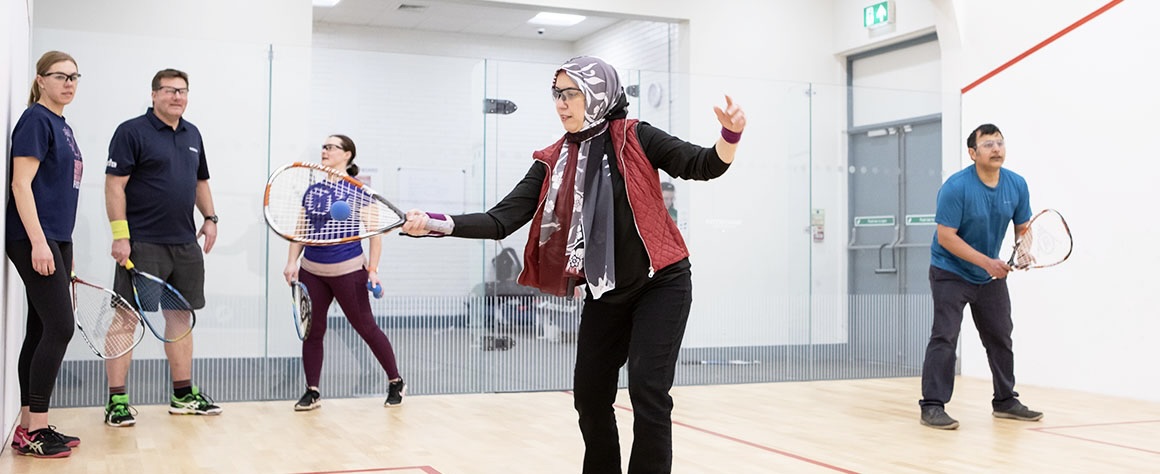
Project aims to make the sport inclusive and available to groups that are typically less active
By ALAN THATCHER – Squash Mad Editor
England Squash is among a group of more than 120 organisations working in partnership with Sport England to level up access to sport and physical activity across the country.
The project is aimed at providing increased access to sports facilities that historically have been less welcoming to women and certain ethnic and economically challenged groups in society.
Being part of Sport England’s Uniting The Movement strategy is a massive leap forward for squash, a sport that began in the privileged environments associated with elite private schools, the senior ranks of the armed forces, colonial embassy staff, wealthy businessmen and their offspring.
In recent decades the sport has broken down many social barriers but there is clearly much work still to be done.
England Squash claim that tackling inequalities and enhancing the diversity of the sport are at the heart of their strategy called Squash in a Changing World.
The governing body will receive expertise, support and an investment of £7,351,682 of government and National Lottery funding from Sport England to co-deliver the ambitions of its Uniting the Movement strategy.
According to a media release, Sport England research shows that some groups are typically less active – including women, people with long-term health conditions, people with a disability, people from ethnically diverse communities and lower socio-economic groups.
Right now, the opportunities to get involved in sport and activity, and reap the rewards of being active, depend too much on your background, your gender, your bank balance and your postcode.
Sport England’s investment will enable England Squash to target priorities around increasing participation, enhancing diversity and nurturing talent.
Women and girls, people with a disability and those from ethnically diverse communities are just some of the groups that England Squash is seeking to attract with this funding.
Research will be used to better understand the reasons why some people are less likely to play, and help ES to develop new campaigns, initiatives and partnerships to address these inequalities with the aim of creating an inclusive and diverse squash community.
Over £550m is being invested in total, with the partners including England Squash receiving funding for up to five years. This new funding model from Sport England provides longer-term financial security as organisations recover and reinvent from the Covid-19 pandemic.
According to ES, all partner organisations were selected by Sport England due to their ability to influence change and improvement at the heart of the system they are a part of, no matter how big or small.
Sport England hope this is the first step on a journey to revolutionise their approach to long-term partnerships as it seeks to team up with innovative organisations to deliver Uniting the Movement and build a nation where more people can get active.
Mark Williams, CEO at England Squash, said: “We are thrilled to have received this award from Sport England which will help us to deliver on our new long-term strategy which aims to grow the game in England and make radical advances in inclusion and diversity.
“Many people still face barriers to participating in squash and we want to ensure the sport is more representative of society as a whole. We’re working hard to break down the barriers to play by teaming up with partners from across the game to help create more opportunities for those that don’t currently take part.
“We would like to thank Sport England and the National Lottery for their ongoing support, and we look forward to working with them and our partners to realise our shared vision to create a thriving, diverse and growing squash community.”
Tim Hollingsworth, CEO of Sport England, added: “Sport England’s goal is to get everyone active, no matter who they are, where they live, or what their background is. But we know that certain groups – like women, people from ethnically diverse communities and people with a disability – are more likely to be inactive.
“We can only innovate and tackle inequalities effectively by thinking about long-term change. Uniting the Movement is a long-term vision, and our funding approach needs to reflect that.”
He threw down a challenge by adding: “Changes to our funding model will help us achieve our goal, by making it easier for our partners to do what they need to do to level up and deliver.”
Pictures courtesy of England Squash















 Phone: (800) 737. 6040
Phone: (800) 737. 6040 Fax: (800) 825 5558
Fax: (800) 825 5558 Website:
Website:  Email:
Email: 






